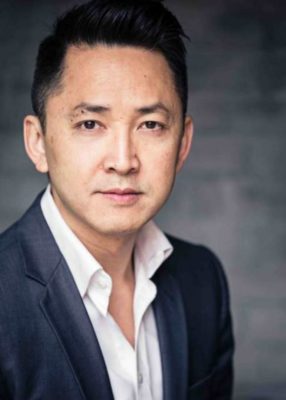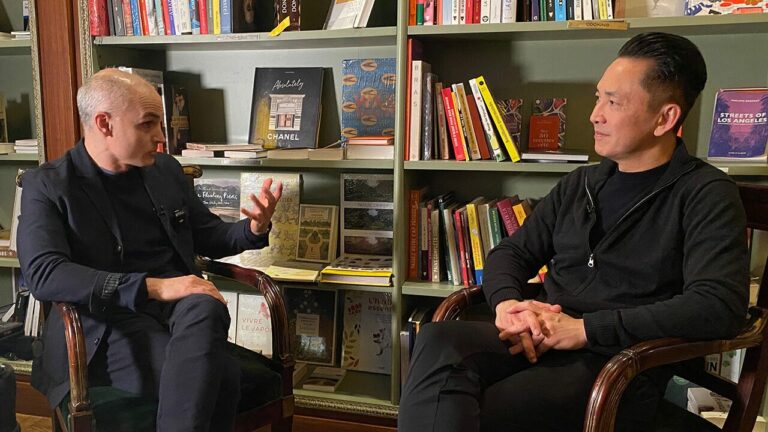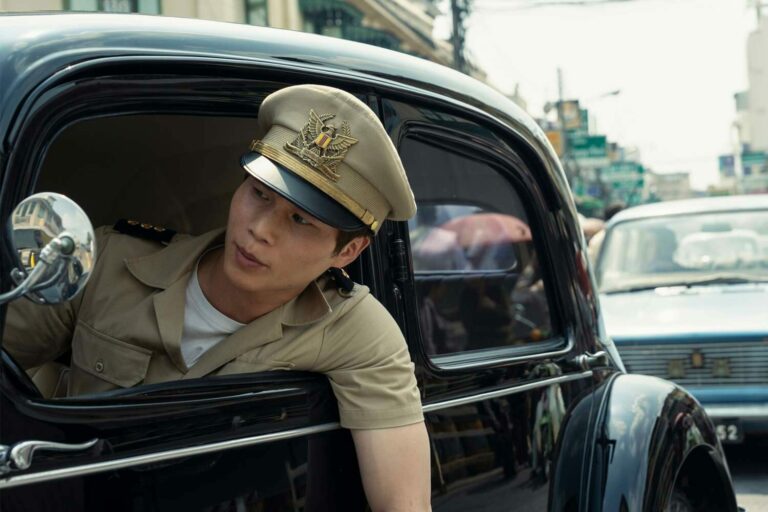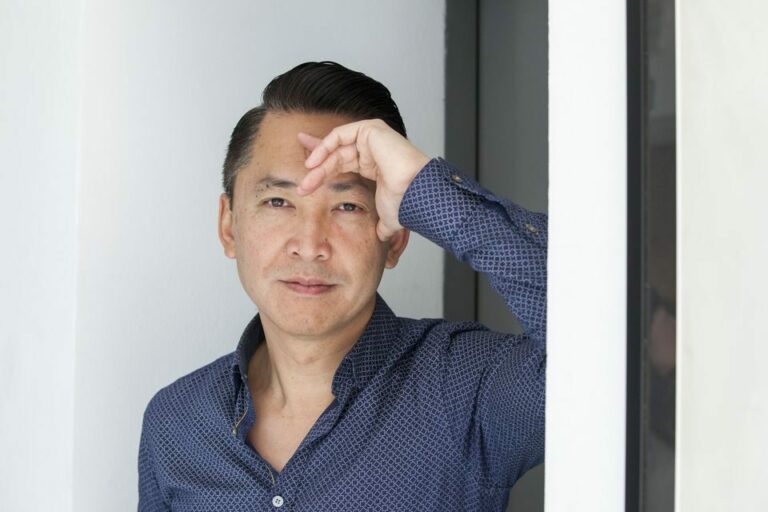Viet Thanh Nguyen discusses The Refugees with Michael Cathcart in this interview for ABC Melbourne Radio National.


The writer Viet Thanh Nguyen was born in Vietnam as that war was coming to an end, and raised in the USA. He teaches English and American Studies and Ethnicity at the University of Southern California and lives in Los Angeles, where he writes both fiction and non-fiction.
His novel The SympathiZer won the Pulitzer Prize for fiction (and he spoke about it with Michael on the program right here).
Now Viet returns with seven powerful short stories under the title The Refugees.
At a time when President Trump is seeking to bar people from certain countries from entering the US – and has pledged to build a war to keep Latin Americans out of the Home of the Brave – this collection could not be more timely.
Viet Thanh Nguyen speaks to Michael Cathcart from Los Angeles.
Read the transcript below:
Michael C.: Now here’s a song called Country At War by the Vietnamese songwriter Tâm Anh, and performed by the pop singer Tan Lan in 1975. The words say, “Look at the night streets and empty shops. Corpses of strangers on top of barbed wire, and innocent children looking helplessly on.” (singing)
Michael C.: Well, the writer Viet Thanh Nguyen was born in Vietnam as that war was coming to an end. Then he was raised in the USA, and you met him here on Books and Arts last year when we discussed his masterly novel, The Sympathizer, which won the Pulitzer Prize for fiction. He teaches English and American studies and ethnicity at the University of Southern California, and he returns with seven powerful new stories out of the title, The Refugees. Viet Thanh Nguyen, welcome back.
Viet T. N.: Thanks for having me back, Michael.
Michael C.: So nice to have you in our studios there in LA. So each of these stories takes us into the minds and experiences of people who know what it means to be a migrant or refugee. And the first one’s a ghost story. The narrator is a Vietnamese woman who lives with her mother and who sees ghosts, the mother sees ghosts. And the narrator says this. “Looking back I could see that we had passed our youth in a haunted country.” What does she mean when she says that?
Viet T. N.: Well, I think I grew up with the sense that the Vietnamese people really did believe in ghosts, this was a part of everyday folklore and the stories that people told each other. Just imagine that the people who were living in Vietnam were telling these kinds of ghost stories. But more than that, the country, the period of time that I’m referring to is the period of war. And so there were people being killed and people being lost and going missing and so on. And so that’s what lends that sense of being haunted to the people who were living during that time period.
Michael C.: So in this story, the narrator is alone at night. This is in America, and her dead brother comes to call. And he brings with him memories of the boat on which they escaped from Vietnam and on which he died. And she experienced terrible brutality. We learn all that in the story. So you’re gonna read us a little from that story. Anything else you want to say before we have this reading?
Viet T. N.: Well, I want to say that this story took me 17 years and 50 drafts to write. So it was a really difficult story to write. It turned me into a writer, but I think when readers read it, it will just take them about half an hour to finish. So here’s a passage.
Viet T. N.: The black shorts and gray T-shirt stank of brine and were heavy with more than just water. When I carried them to the kitchen, the weight of the clothes in my hands was the weight of evidence. I had seen him wear these clothes on dozens of occasions. I remembered them when the shorts were not black with grime but still pristine blue, when the shirt was not gray and ragged but white and neat. “Do you believe now?” my mother said, lifting the lid of the washing machine. I hesitated. Some people say that faith burns inside them, but my newfound faith was chilling to me. “Yes,” I said. “I believe.”
Viet T. N.: The machine hummed in the background as we sat for dinner at the kitchen table, the air anointed with star anise and ginger. “That’s how come it took him so many years,” my mother said, blowing onto her hot soup. Nothing had ever daunted her appetite or dented her cast-iron stomach, not even the events on the boat or the apparition of her son. “He swam the entire distance.”
Michael C.: Mm. Yeah, that’s brought it all back to me, the experience of reading your book, which I read over the summer, actually. You said it took you 17 years to find that. What have you discovered now that you didn’t have 17 years ago?
Viet T. N.: When I started off, this is how I learned to write was writing these short stories and the collection. And it was really trial and error, and the biggest challenge for me as a writer was trying to find a way to cram all of this history into the confines of a short story and so with this particular story, it took me 50 drafts to find out what didn’t belong in the story before I was able to zero in on the story and the relationships that were at the core of what was going on.
Michael C.: Well, you followed that piece of advice that was once given to me. If you want to tell a big story or want to explore big ideas, find a very intimate place that you can go to. Almost find a small thing that enables you to say a big thing.
Viet T. N.: For me, that was a lot harder to do in practice than in theory. In theory I understood that, but I think that’s why writing The Sympathizer came to me more naturally because I’m more natural being a novelist, I need the big landscape to work in than to deal with the big themes of history and politics. The Refugees does deal with history and politics, too, but most of that is taking place in the background outside of the stories. And instead the stories themselves focus on these intimate moments, intimate relationships that you’re talking about.
Michael C.: Do you mind telling us about your personal stake in this experience about your own journey to the USA?
Viet T. N.: I was born in Vietnam and came as a refugee when I was four years old in 1975 when Saigon fell. And we ended up in the United States at a place called Fort Indiantown Gap, Pennsylvania, which was one of four military camps that were used to resettle refugees. And-
Michael C.: It sounds like something out of Western movie. Doesn’t it?
Viet T. N.: Yeah, they still call these camps forts, you know? These military bases forts even though they don’t look like forts from these cowboy and Indian movies and so on. They’re just barracks. But in order to leave these places, you had to have a sponsor. An American sponsor to take you so that you wouldn’t be drain on social welfare. So the problem was that no sponsor would take all four in my family, my parents, my older brother, and me. So my parents went to one sponsor, my older brother went to another, and I went to a third. I was four years old, and all I understood at that time was that I was being taken away from my parents. And I remember howling and screaming for them, and that was the beginning of my entry into memory. So being a refugee has been something that marked my very origins, and I’ve carried that with me ever since.
Michael C.: So you were brought up by strangers.
Viet T. N.: For a few months. And they were very nice people, obviously, to take a strange little boy in. and someone who didn’t even speak English at the time. And so I appreciate that. But definitely when you’re … Well, I have a son who’s three and a half right now. I look at him. If someone were to take him away from me for three months, he would be devastated by that. I would be, too, obviously. And there’s no way for someone at four years old to really make sense out of that.
Michael C.: At the time you went to the US, there were Vietnamese refugees coming to Australia on boats. And in theory, I guess, this wave of refugees was not to difficult for Australians and Americans to accept because you were fleeing the communist who’d won the war. The war that the US and Australia had fought in and arguably prolonged in Vietnam. What was the mood? Was there a dominant mood in the US to your wave of Vietnamese refugees who started to arrive at that time?
Viet T. N.: Well, looking back as a scholar, I can see that the polls indicate that the majority of Americans did not want to take Vietnamese refugees. So America had a very intimate history with Vietnam, obviously. But that didn’t mean that Americans felt intimate with the Vietnamese people, and I think many Americans thought that the Vietnamese, even the ones who were their allies were strange and alien people, and the United States was going through a recession and why should we take these people in?
Viet T. N.: Of course, at four years old, I didn’t know any of that. But my first inkling that some of that feeling might be percolating was when my parents moved to San Jose, California in about 1978, 1979. And they opened one of the earliest Vietnamese grocery stores in that city in downtown. And I remember at seven or eight years old walking near the store and seeing in the storefront of the window of another storefront a sign that said, “Another American driven out of business by the Vietnamese,” and that was my first inkling that we were not necessarily welcome here. Even when we were doing something like opening a business.
Michael C.: On RN, this is Books and Arts with Michael Cathcart. My guest is the Pulitzer Prize winning American writer, Viet Thanh Nguyen, who’s here with his new book, a collection of very bold and evocative short stories called The Refugees. What you couldn’t have known when you sat down 17 years ago to start writing these stories is how resonant that’d certainly be because you’re publishing them at the time when President Trump is making refugees an issue on which he wishes to take a stand. And we all know what his attitude to them is. What’s the debate look like in America? Do you feel as though there is kind of big conversation between the two sides?
Viet T. N.: I don’t think there’s really a conversation. I think there is a lot of talking across each other over each other, and that reflects a very serious political divide in the United States between Republicans and Democrats and those who believe in Donald Trump and those who don’t. So when it comes to the issue of refugees, we really have two radically different perceptions of them. On my side, I think, we see that America’s had a long tradition of hospitality towards refugees and immigrants and we should be welcoming people in and taking care of them. Especially if there’s some sense that the reason they’re refugee is that because we’ve had a hand in the creation of that situation.
Viet T. N.: And on the other side, there are people who represent another really deep seated perspective in American culture, and that’s the one that says, “America’s for Americans, and immigration is not good for us and we should keep people out and we should take care of our own.” And that side is also people invested in the idea of law and order that if the President says, “This is the law,” we should follow what the President says. And from my perspective, there’s a difference between law and justice. This may be legal to exclude certain populations as we have done historically in this country, but it hasn’t been just, and it isn’t just today.
Michael C.: On that conservative side, though, yet, there is a view that liberals sometimes sound as though they don’t take the threat of terrorism seriously. As though it’s risible that there may be terrorists among these people.
Viet T. N.: I think if you look at the record of the Clintons and Obama, for example, they took terrorism very seriously. They carried out certain kinds of policies in other countries and domestically around deportations, drone strikes, use of special forces, all these kinds of things that were from, at least one perspective, fairly serious on the terrorism front. And so what it boils down to is the question of perception. What kind of measures are necessary to protect the American people and so on? And in terms of the populations that have been targeted by the Muslim ban that President Trump tried to enact, the irony is that that was directed against seven countries that hadn’t sent any terrorists to the United States whereas the countries that actually have sent terrorists to the United States have not been banned from sending further people here.
Michael C.: Now, you say that in the minds of others, of other Americans that you are yourself not a refugee but you’re an immigrant to the United States. Can you talk about that distinction?
Viet T. N.: I think that, for example, when The Sympathizer came out and it was a success story and I was a success story, part of the way that people made sense out of that to was to call me an immigrant and to call The Sympathizer an immigrant novel. And so I had to be very assertive in saying, “No, I’m not an immigrant, I’m a refugee, and The Sympathizer’s not an immigrant novel, it’s a war novel. And the reason why Vietnamese and other Southeast Asian refugees are in the United States is not because we necessarily chose to come here but because a war was fought in our country and drove us out.”
Viet T. N.: So the distinction, the reason why it’s important is that immigrants in the United States, even though sometimes they’re wanted and sometimes they’re rejected, they nevertheless are part of the American mythology of the American dream. And countries can make sense out of immigrants as people who want to come to their countries, whether it’s United States or Australia or Europe.
Viet T. N.: Refugees are very different. They’re unwanted where they came from, they’re oftentimes unwanted where they arrive at. And they are also, I think, really disturbing to citizens of host countries because they bring with them this sense of contamination that something horrible happened in their country to turn them into refugees and perhaps that horrible thing, that war or that catastrophe could happen here in the host country as well. And that is a really disturbing reminder of our fragility of the shaky foundations on which everything we take for granted is built. And that we perhaps could one day become refugees ourselves.
Michael C.: And do you write these stories as a kind of letter to that bigger America? Is that what you’re doing, addressing that audience?
Viet T. N.: I think so, yes, because growing up as a Vietnamese refugee in the United States, I was aware that the Vietnamese people I knew had really important stories that mattered to them greatly. And these stories were utterly inaudible and invisible to the larger American population. To the rest of the world, too, who when they thought about Vietnam, thought about the Vietnam War, and they thought about the Vietnam War really thought about the American war, the American experience. And so I thought from an early age that it would be my mission to try to tell some of these stories to Americans, obviously. To the world as well but also to my fellow Vietnamese people who were not hearing their stories out loud or in the general public. And I was hoping that this book would reach all of these different audiences.
Michael C.: On RN, we’re talking to the American writer, Viet Thanh Nguyen, about his new collection of short stories which is called The Refugees. Let’s talk about your story, The War years, which is set in a grocery store. Now, you just told us that you grew up in a grocery store yourself, so is this an autobiographical story?
Viet T. N.: It is the only autobiographical story I’ve ever written.
Michael C.: Uh-huh (affirmative).
Viet T. N.: The only thing I’ll say about this is that the depiction of the father in that story is not autobiographical in case it ever gets back to my dad. ‘Cause he’s a kind of a comic figure in War Years, but my dad is definitely not a comic figure.
Michael C.: So we’re in a Vietnamese family grocery store, and one of the customers is Mrs. Ho, who is constantly raising money for plan to retake Vietnam from the communists. She’s quite a menacing character for all her sort of friendliness. She’s quite threatening. Can you talk to me about her?
Viet T. N.: My mom once told me just in passing that there were these people who would come to our store and ask for money to support the anti-communist cause, and there was basically … I don’t know if there was extortion or blackmail, but there was definitely the sense that if you didn’t give you might be under suspicion for not supporting the cause enough. And in the black and white world of anti-communist politics, if you weren’t with us, you were against us, you know? And there was a real, you know, lot of red-baiting that was happening in the Vietnamese community back then. And even still today, anti-communism is still really strong in the Vietnamese populations that are densest in California. And I knew that these people were, as menacing as they were, were also really human. You know, they were damaged people who had lost a lot and for any number of reasons, and I wanted to draw a picture of a woman who was both menacing in terms of what she was trying to do through extortion but also really human and vulnerable because the reason she was doing it as we discover in reading the story is that she has lost a lot and she’s in deep pain. And this is her way of coping with that pain.
Michael C.: There’s also a really scary scene in which a very highly strung young man with a gun burst into the shop intending to rob it. Did that happen?
Viet T. N.: The scene is actually that he bursts into the house of the shopkeepers and tries to rob them at gunpoint, and that really did happen to us. There was a phenomenon called home invasion that apparently the Vietnamese invented in the 1980s, and the irony of this crime was that it was young Vietnamese men invading the homes of other Vietnamese people because they knew where these people would keep their money, you know, in mattresses and so on. They wouldn’t’ take their cash to the bank. And so when I was growing up, my parents would always say, “Don’t open the door for Vietnamese people because this could happen to you,” and there were all kinds of horror stories about what these young men would do. And so one day somebody knocked on the door, and he wasn’t Vietnamese. And somebody in our house let that person in. I don’t remember who it was anymore. I don’t think it was me. And that unfolds very much in the way that I record in the short story which is that my mother saved us by running out and dashing past this guy with a gun and running out into the street. And we lived right in front of the freeway, so there was all these cars out there. Once she made it out onto the street, she was safe. And that’s how she saved our lives.
Michael C.: I’ve been wondering about the state of the American novel. Because it strikes me having read your novel and now read your short stories. They’re so politically charged. Political in the sense that they’re about race and class and gender and the way in which they determine your life opportunities. I take that to be the kind of basis of politics.
Michael C.: A lot of American novels seem to me about the family as the site of the action. And about personal neurosis and personal striving. Do you see yourself as somehow standing apart from the kind of majority tendency in the novel?
Viet T. N.: Very definitely so. I mean, The Refugees fits more into that framework that you’re talking about, about the domestic and the intimate and the realistic in American fiction. And the reason why is because, again, I was learning how to write and imitating the models that were out there and popular in the New Yorker and other kinds of periodicals like that. But in coming to The Sympathizer, I felt that I had already done that domestic intimate realistic model, and I knew very clearly that that was the dominant framework for writing in the United States. And I wanted to rebel against that by writing a novel that was very pointed and very political. And I do feel that contemporary American fiction is not political. And that that is a serious problem. And the real challenge of writing The Sympathizer was obviously to make a very political novel interesting and hopefully also humorous and satirical so that the politics would go down easier for the audience.
Michael C.: Isn’t the great thing about America that it’s so full of contradiction? Because they give you the Pulitzer Prize for breaking the rules.
Viet T. N.: I am amused by the fact that I wrote a novel that some people think is anti-American. And for that, they gave me the Pulitzer Prize. It’s a real dilemma to be in as a writer. It’s a good dilemma but it’s still a dilemma.
Michael C.: Yeah, but it’s also the joy of America, isn’t it?
Viet T. N.: Yes. I’m sure other countries have contradictions and paradoxes, too, but that is one of the particular American …
Michael C.: Viet Thanh Nguyen, thank you for joining us. It’s been lovely to talk.
Viet T. N.: Thanks for having me.
Michael C.: Viet Thanh Nguyen, his book is called The Refugees, and it’s published by Grove Atlantic. It’s a tour de force. It’s humane, it’s smart, it’s fiction, which enlarges our sense of life.


